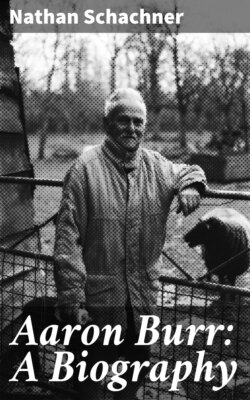Читать книгу Aaron Burr: A Biography - Nathan Schachner - Страница 29
На сайте Литреса книга снята с продажи.
2. Martinet Burr
ОглавлениеTable of Contents
Burr took charge at once. His hand was firm, yet even. He tightened the lax discipline, instituted a regular series of strict drills and rigorous inspections. The lounging, sullen men were made to toe the mark, and toe it with the alert smartness of well-trained soldiers. Those of his officers who resisted the new order of things, or could not accommodate themselves, were dismissed summarily from the regiment. For two months he labored incessantly. By the end of that period he had a disciplined group, increased by his efforts to 300 effectives, and, surprisingly, he had made himself the idol of the men in the ranks and of officers alike. He never employed whippings or other forms of corporal punishment, then quite the usual thing in the patriot army. The men knew him to be strict, yet fair and just, and ready to listen to their reasonable complaints. He tended the sick himself, and opened his private purse freely to the necessitous. “His attention and care of the men,” averred a subaltern, “were such as I never saw, nor anything approaching it, in any other officer, though I served under many.”[96]
Yet he found time from his arduous duties to meet, and visit socially, a certain Mrs. Theodosia Prevost, wife of an English officer, who lived in Paramus with her mother, her sister, and her five children.
In September, 1777, while the regiment still lay at “Suffren’s, in the Clove,” news was received that the enemy had gathered at Hackensack in great force and was advancing into the country. Colonel Burr immediately put his force into motion to oppose their passage. While on the march an express came from General Putnam ordering him to retire with the public stores into the mountains rather than risk battle with a greatly superior enemy. The young Colonel replied firmly to the messenger—he was forever disobeying orders he conceived ill-judged—that “he could not run away from an enemy he had not seen, and that he would be answerable for the public stores and for his men.”
They arrived at Paramus, some sixteen miles away, by sunset. There they found considerable bodies of the militia, hastily assembled, in great alarm and disorder, and doing more damage to the neighboring farms than to the still-distant enemy.
Burr set them to work at once repairing the fences they had trampled down, and moved forward with thirty of his own men and some militiamen to act as guides to reconnoiter the enemy. He found the advance picket posts some three miles from Hackensack. He at once ordered his little troop into a nearby wood to get some sleep—they had marched under forced draft over thirty miles since noon—and went on alone to spy out the size of the opposing force. Within a half-hour he was back, had aroused his sleeping men, and led them stealthily between the outflung sentinels until only a few yards separated them from the main body of the pickets, without an alarm having been given.
The surprise was complete. Most of the enemy force was killed, and the rest taken prisoner without the loss of a single American. Still unresting, Burr sent an express back to Paramus to bring up the regiment and rally the country. But the British had had enough of this most unorthodox war. They retreated the very next day, leaving behind them the greater part of the cattle and plunder they had garnered. Burr wished to pursue and attack, but General Putnam had sent another, and this time peremptory order, commanding him to join without delay the main Continental Army, then in Pennsylvania.[97]
Burr bowed to the inevitable. By November, 1777, Malcolm’s Regiment was at Whitemarsh, about twenty miles from Philadelphia. A few weeks later they went into winter quarters at Valley Forge. That long, dark winter of cold and starvation and suffering, while the British dined and wined in the warmth and luxury of Philadelphia; that winter when the fortunes of the embattled Colonies seemed at their lowest ebb!
It was still Malcolm’s Regiment, but Lieutenant-Colonel Burr was to all intents and purposes its Colonel. Malcolm himself observed the gallant actions of his command with a “father’s” pride, and from a safe distance. The Regiment was attached to General Conway’s Brigade. Burr’s Orderly Books for this period are full of the minutiæ of daily routine, enlivened with reports of courts-martial over which he presided, or the results of which were sent to him for approval.
For instance, Private Thomas McCalvy, who was accused of setting fire to gunpowder and thereby burning a fellow soldier’s arm, was given two days’ extra fatigue; while Thomas Barry, whose offense consisted in plundering the inhabitants, riotous and disorderly behavior, and “insolent and abusive language to officers,” was adjudged worthy of 100 lashes “on the bare back.” To which Colonel Burr appended in his firm, incisive hand, “the Above Sentences are Approvd.”[98]
Or that other trial, partaking somewhat of the nature of the ridiculous. “Michl Brannon Accused with taking a Shirt out of Coll. Burr’s Room from among the Clothing without Liberty & wearing the Same, & for Concealing the Shirt in another part of the Room & not putting it among the Clothing.” For which the aghast court-martial sentenced him “to Receive 50 Lashes but on account of his Youth beg Leave to Recommend him to the Comdg Officers Clemency.” Which recommendation his commanding officer, one Captain Tom, duly noted and graciously remitted half of the required number of lashes.[99]
It was this same Captain Tom, incidentally, for whom Colonel Burr himself had interceded only a month before for having been absent without leave.[100]
